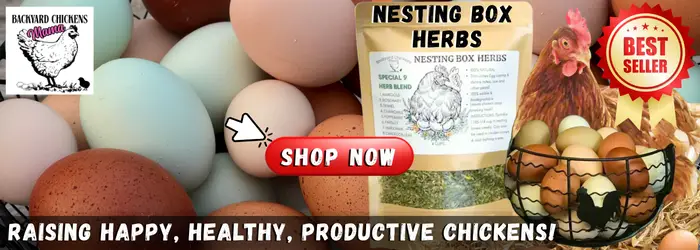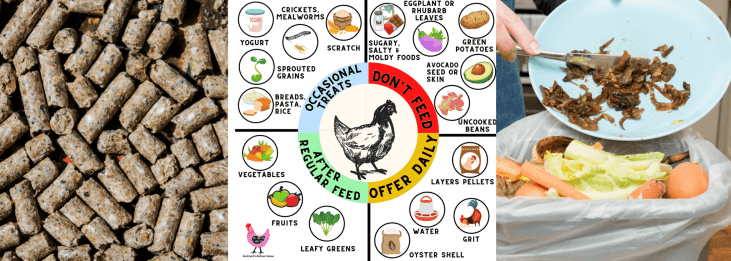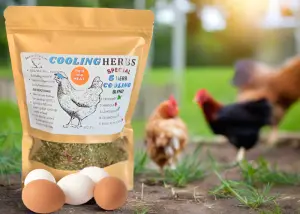
Chickens can be very messy eaters. For survival, it is instinctual behavior for a chicken to scratch at the ground for their food. Even if feed is hanging nicely in a feed container, they will do their best to scratch at it and scatter the feed all over the ground, wasting a fair amount. This article will show you how to reduce chicken feed waste.
1. Don’t Mix Chicken Feed with Treats
Chickens are like children (and many adults). If you give them a choice between eating their vegetables or a treat, they will choose to eat the treat. They would fill up on the treat and not want to eat their vegetables.
Don’t mix your chickens main feed with anything else. If you feed them layers pellets, feed them this first. This feed contains the proper amount of nutrients that your flock needs.
After they eat their regular feed, then it’s ok to give them some treats. Just make sure that their treats are not more than 10% of their daily diet.
2. Ration the Chicken Feed
Each chicken should eat about 1/4 lb of chicken feed (layers pellets or crumbles) per day. This can vary slightly and can depend upon the size, breed, type of feed and if you allow your chickens to free-range.
Signs You Need to Ration Your Chickens’ Feed (Overfeeding)
- Your chickens are going through more than 1/4 lb feed per chicken per day.
- A lot of feed is left on the ground at the end of day.
- Your chickens are obese.
- Change in laying patterns.
- Change in egg quality.
- Chickens are more lethargic.
3. Put Food Away Every Evening
If you choose to let your chickens graze on chicken feed throughout the day, make sure you bring it in at night. Leaving it out throughout the night is an open invitation for overnight grazers to make their way into your chicken coop. Not only for the chicken feed, but also eggs and your chickens too!
Don’t let the smell of leftover chicken feed be a reason to entice nighttime chicken predators to break into the coop and attack your chickens.
Protect Against Nighttime Chicken Predators
- Raccoons
- Opossum
- Fox
- Coyote
- Owl
- Mice
- Rats
- Bear
- Snakes
Other sources of food that will attract nighttime chicken predators are leftover cat and dog food and water as well as wild bird feeders.
4. Place Chicken Feed Up Higher
It is natural chicken behavior to peck and scratch for food and this includes food that is in a feeder. You can help to stop them from scratching their feed by raising the feeders up a few inches. This will help to keep them from scattering the seed all over the ground.
Because chickens are natural grazers when it comes to food, I like to make it a point to scatter some daily treats out in the field or chicken run, such as scratch, to satisfy their urge to peck and scratch.
5. Change the Type of Chicken Feed
There are 3 common forms of chicken feed; mash, crumbles and pellets. It’s common to start baby chicks off with either chick mash or crumbles and when they are closer to 16 weeks or laying, change them over to layers crumbles or pellets.
I have found that once I switch my chickens over to pellets they create a lot less mess and waste quite a bit less too.
6. Ferment the Chicken Feed

Fermenting chicken feed involves soaking and stirring chicken grains in distilled water for 3 days before draining and serving to your flock. Because it unlocks up to 50% additional nutrients for you chickens, they will eat less feed.
Benefits of Fermenting Chicken Feed
| BENEFITS OF FERMENTING CHICKEN FEED |
|---|
| DECREASED FEED WASTE |
| INCREASED PROBIOTICS |
| INCREASED EGGS |
| TASTIER EGGS |
| THICKER EGG SHELLS |
| INCREASED NUTRIENTS |
| DECREASED POOP |
| BETTER DIGESTION |
| DECREASED FEED COST |
| HEALTHIER CHICKENS |
7. Sprout Chicken Grains
Sprouting chicken grains is another way to help reduce chicken feed waste. My chickens go absolutely crazy over sprouted grains when I serve it to them. There isn’t a sprout wasted. You would think I was serving them candy!
Sprouted grains contain up to 50% more nutrients. These nutrients become available to your chickens once the grain sprouts.
Additional Benefits of Sprouting Chicken Grains
| SPROUTED GRAINS CONTAIN INCREASED OF THE FOLLOWING NUTRIENTS |
|---|
| VITAMIN C |
| ZINC |
| IRON |
| FOLATE |
| MAGNESIUM |
| PROTEIN |
8. Serve Chicken Fodder
What is the difference between sprouts and fodder?
“Sprouts and fodder both start out as grains. They are called sprouts when you harvest them between 1/2″-2″ and anything taller than 2″ is known as fodder. If you are feeding the fodder to your chickens, it is best to feed it to them no longer than 4″ in length. Any longer than this and it increases the chances of it developing an impacted crop.”
Are Sprouted Grains Better for Chickens?
Serving fodder is an excellent way to be able to provide greens for your chickens all year round. Just like grains, fodder is loved by my chickens and every bit of it is usually devoured by them.
Fodder is filled with nutrients, so you will notice that your flock will not need to eat as much feed.
Top Chicken Grains Used for Fodder
| WHEAT | BARLEY |
| ALFALFA | OATS |
| SOY BEANS | MUNG BEANS |
| SUNFLOWER SEEDS | MILLET |
| SORGHUM | BUCKWHEAT |
| GRAIN RYE | PEAS |
| LENTILS | CORN |
9. Keep Feed Storage Containers Secure
Keep your chicken feed stored in containers that are secure so animals and predators can’t get into it.
Securing your feed storage containers also involves using the right type of container to store your chicken feed in.
Raccoons can very easily open gates with latches and lift a lid off a simple garbage can. Cats, dogs, rats, mice, opossum and raccoons can easily gnaw through chicken feed bags for a midnight snack.
Best Way to Secure Chicken Feed

Metal garbage cans with a 2-step lid on it will deter most animals and predators from being able to get to your chicken feed.
2-step locks require multiple steps in order to open. These have worked great for me to deter rodents, raccoons and opossums. I have seen raccoons, opossums, rats and mice at night in my neighborhood, but they have not been able to get into my metal garbage cans with a 2-step lid on it.
10. Keep Chickens Entertained
Bored chickens are likely to get into things that they shouldn’t. This includes spilling, scattering and wasting their everyday chicken food. Chickens need to have access to peck and scratch for their food (at least some of the time) and explore their surroundings. They can easily get bored if they are not exposed to new things.
Best Ways to Entertain Bored Chickens
- Throw some mealworms out for them to eat.
- Hang a new roosting bar in their coop or chicken run.
- Give them your used Christmas tree before disposing.
- Give them your used jack-o-lantern before disposing.
- Feed them some sprouted grains or fodder.
- Let them out for some supervised free ranging.
- Spend time with them!
- Hang some fruits and veggies for them to eat.
- Make a new dust bathing area for them.
- Throw some crickets out for them to capture.
CONCLUSION: 10 Best Tips-How to Reduce Chicken Feed Waste
| 1. Don’t mix chicken feed with treats. |
| 2. Ration the chicken feed. |
| 3. Put food away every evening. |
| 4. Place chicken feed up higher. |
| 5. Change the type of chicken feed. |
| 6. Ferment your chicken feed. |
| 7. Sprout chicken grains. |
| 8. Serve chicken fodder. |
| 9. Keep feed storage containers secure. |
| 10. Keep your chickens entertained. |









